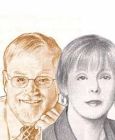Conscientiousness
Your Professional Life in Three Acts
The Downside of Being Conscientious
Posted September 21, 2014
Psychologist Tony Athos once described the three acts of a professional life as: Learning the Game, Winning the Game, and Defining the Game. Winning the Game has two phases. The beginning phase of Winning the Game is proving your technical competence to yourself and to others. By the end of the Winning the Game, phase, you have already proven your competence.
The real challenge is demonstrating to the world who you know and you are known by key decision makers in your world.
This is referred to as social capital.
In professional service organizations, leaders with high social capital are given the designation “rain makers” because of their ability to bring in opportunities. They are so critical to the life of organizations, their departures are sometimes followed by the collapse of the entire firm.
The Downside of Being Conscientious:
In our work with conscientious young professionals, we find they often fail to grasp this transition from “what” you know to “who” you know. Organizations fail to assist these conscientious professionals not providing a celebratory event to mark the end of one phase to the beginning of a new phase. For example
One of our law firm clients has fourth year associates have a rare celebratory luncheon with a key partner on the Management Committee. The purpose of the luncheon is to say, “Congratulations. You have proven to us you are a competent attorney. You are no longer an Associate. You are a Senior Associate. Now here is the challenge…..”
If your organization lacks such a celebratory event, it is up to you to figure it out yourself. The fourth year following the date when you received your highest academic degree is a rough way to guide you. You had better have a reputation for being technically competent by the fourth year!
Social Capital: It’s Like Money in the Bank that Isn’t Taxed.
Having social capital allows you to make critical life pivots that allow you to move into the Defining the Game stage with grace. Consider the case of Alan Faber:
His career began in Human Resources. But he began to develop relationships with senior financial executives. He went out of his way to be helpful to them. The Financial Executives International is the global professional association of senior finance executives. Despite his not being a finance professional, Alan was awarded the FEI National Distinguished Service Award. He received the Gorham Brigham Lifetime Achievement Award as part of the FEI CFO of the Year program.
At age 72, Alan was hired for a full-time senior position at an international CPA firm. Alan is now 76 and he has his own successful consulting firm specializing in relationship development and management.
By adopting a “givers gain” attitude towards a specific group of leaders, his time, Alan enriched his social capital and has been able to keep active while enjoying what he does.
In our work with leaders, we find that those who fail to grasp the relationship between what you know versus who you know dooms people to spending their 50’s and beyond constantly afraid of younger, cheaper, and more energetic people ready to take over their jobs.
The Special Case of Professional Services:
In the case of professional services, this issue is going to become more acute. Once upon a time, the threat might have been from only from younger, cheaper Associates at the firm. That threat continues but the threat has expanded.
For example, one law firm now has some legal documents reviewed by Indian lawyers in another country who are willing to work at a fraction of the professional fee of in-house attorneys. A CPA firm uses the latest analytical software to do a first cut review of complex taxes forms, a job that used to be done by Associates. And assistant professors will be replaced by full professors doing online courses with hundreds or thousands of students in the virtual classroom.
When is the Right Time to Build Social Capital?
There is an old cliché in banking circles: the best time to apply for a loan is when you don’t need one.
Do you lack the time to meet new people in your life? Do you lack the desire to meet new people in your life? If so, then this is the perfect time to do it!
No investment adviser would recommend that you invest for retirement when it “feels” right or when you decide that you “need” to do it. Investing should take place when you don’t feel the need for it.
Whether it is investing or enlarging your social capital, the issue is about developing smart behavioral habits before the need for such behavior arises.
Join Two Associations:
We tell our clients to join two associations: one might be an association in your industry/sector. For example the American College of Health Care Executives or the Downtown Retail Merchant Association. The second association might be in your functional area. An example might be the New Jersey Psychological Association, the Los Angeles Bar Association, or the Advertising Club of Boston. Don’t just go to cocktail parties. Get involved in a committee. Be known as a player.
Life circumstances might dictate substituting one professional association for a more community based organization important to your role as parent. For example, you could substitute involvement in your local Church or school parents association or Little League. The important thing is to be known.
Do not wait to build your social capital “when I have free time.” The only time you will have free time is when you are in between jobs. And that’s the worst time to build social capital.
For more information about managing your professional association life see this PSYCHOLOGY TODAY article:
http://www.psychologytoday.com/blog/platform-success/201308/rising-dues…
“Face to Face First, then Telephone, then Voice Mail, and last Email.”
John Montgomery was CEO of Environmental Interiors, a national company that makes metal ceilings for airports and museums. He would tell employees that communication at Environmental Interiors, Inc. must flow along defined lines: “face to face first; then telephone; then voice mail. And email is last.”
This is an important framework about social capital.
People who have grown up using the Internet as a social communications tool are most comfortable with email and various social media like Facebook and LinkedIn. They often employ it as the first line of communication instead of the last line.
These web based communication tools are valuable in the exchange of technical information and setting up appointments. Social capital, however, is about trust and competence. It is hard to get someone to trust you if they know without face-to-face contact.
For example, one of our clients is a General Manager working out of his home in Denver. The company headquarters are based in New York City. He is “out of the loop” with the informational management information system known as the “rumor mill.” To develop his social capital within the company, we recommend he spend more time at the corporate headquarters.
Another client of ours is a Provost at a University. In this school, faculty and staff tend to use email as the primary communication tool and copy everyone possible on messages. Emails are so popular it is now being used for letting off emotional steam. We are encouraging her to use emails only to communicate facts. When there are emotional issues, get out of the office and visit the other person. Emotional tenor can easily be misinterpreted via email. And email leaves a record that is hard to erase. Email communication is a poor way to develop social capital.
Be Helpful and Be Specific.
Networking is about value flowing in many different directions. The worst way to network is to think, “What can this person do for me?” The best way to network is, “How might I be of value to this person?” This is what Alan Faber has done in his career.
In the short term, those who give more than they get may perceive that they are being taken advantage of. In the long term, the accounts tend to balance out. In a world filled with people focusing on short-term benefit, those who foster long term relationships of mutual value do stand out.
The people you meet are busy, as are you. Try to provide specific value to demonstrate your ability to make good things happen for them. For example, if someone needs an introduction to a specific individual, we might take out our mobile device. They observe us leave a voice mail message of introduction. In this way the person we are meeting with sees us being helpful and specific.
Be Diverse with Your Network.
It is comfortable to have business relationships in your age cohort. After all there is so much to share beyond the business of business. But that thinking is dangerous.
You want to diversify your age cohorts. When people your age start retiring or dying you want to have a young cohort that thinks well of you. If you are young, it is the older professionals that have the stature and networks to help provide you with opportunities.
The rationale for joining two associations is to diversify your social capital by age and industry. You want to be known in many industries and by people of different ages.
Multi industry exposure is critical. Many of our client companies require new employees to sign non-compete agreements that lock them out of an industry sector for a defined period of time. If the only people you know are people who work in that sector, you have a problem.
Create a Stay in Touch Campaign:
Emails and linkedin.com are excellent adjunct tools to remain in people’s mind.
For example, review the local newspapers and when there is an article favorable about a company where you have a connection, send an email of congratulation
Using news.google.com put in the name of an individual and the name of the company. At the bottom of the screen, Google provides you an opportunity to get alerts sent to your email address every time the company or individual is mentioned in the news. This is a useful way to know when to send “congratulations” to people.
Join 2-4 Groups on Linkedin.com and be a resource to help people. Do not just ask for favors from others. Develop a reputation. And remember Linkedin.com is not a substitute for face-to-face. It is a tool to get you face-to-face with people you want to meet. One group might be your college or graduate school alumni association. A second group might be something related to your function. And the third might be related to your industry. This provides you with diversification and focus at the same time. You can identify groups by going into the “Interests” tab on the Linkedin.com home page.
Other Ideas:
A good book on this subject is TEN TIPS FOR BUILDING STRONGER NETWORKS IN WORK AND LIFE by Stanford University Professor Jeffrey Pfeffer and Stanford University graduate Ross Walker. It is an e-book offered on amazon.com.
Social Capital and technical competence puts you on the way to the Defining the Game stage of your professional life. You are in that stage when fun and work are hard to differentiate.
###




